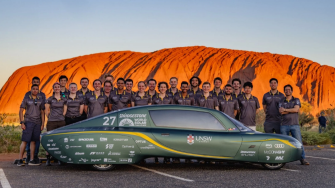
UNSW’s Vertically Integrated Sunswift Racing, opens in a new window project continues to innovate and break boundaries, nearly three decades years after the first tiny solar-powered car was built.
Since 1996 there have been seven different versions of Sunswift built by students, each better than the last, with the various vehicles having broken world records and won a host of prestigious races against global rivals to showcase the talents of a generation of engineering undergraduates.
The most recent iteration, Sunswift 7, set a Guinness World Record, opens in a new window for the fastest electric solar car over 1000km and then claimed the honours, opens in a new window in the Cruiser Class of the Bridgestone World Solar Challenge.
But team principal, Professor of Practice Richard Hopkins, opens in a new window, has set a new challenge for the team currently designing and building Sunswift 8 – to create Australia’s first hydrogen-powered fuel cell car.
Initial plans indicate it will be a two-seater sports car that is capable of completing laps of Mount Panorama, where the famous Bathurst 1000 race takes place, only 20-30 seconds slower than the fastest V8 Supercars.
It also promises to be more environmentally-friendly with the chassis potentially made of hemp and flax rather than carbon fibre.
“Sunswift 8 won’t just be a hybrid, it will be a tri-brid, utilising solar, batteries and hydrogen fuel cells in combination,” Prof. Hopkins said.
“It means the car could potentially run on all three of those technologies, or just one at a time. Potentially there will be a little dial on the steering wheel to select which is being used.
“If you are just going round the corner to the shops you maybe just select solar. If the car is being used to drive to Canberra then perhaps you use battery and hydrogen. And if you are doing a lap of Bathurst then you might choose all three to give it the full beans.”

Prof. Hopkins, who won four Formula One world titles while previously Head of Operations at Red Bull, believes Sunswift Racing highlights the ingenuity and excellence of young engineering students at the University.
“Anyone who is selected to be a part of the Sunswift team is just a very smart amateur – not one of the best-paid professional car makers in Stuttgart working for Mercedes,” he says.
“But they always take all the ingredients they have available and put them together in a brilliant way.
“I don’t like to call them ‘normal’ students. The reason for that is UNSW is the top-ranked engineering university in Australia and this is the top engineering project within the university. So it attracts the very best.
“These young men and women are the future and they continually demonstrate with Sunswift what they are capable of – so imagine what they do when we let them loose on the wider world.”
Prof. Hopkins says that Sunswift Racing is designed to push the boundaries of what is truly possible in automative technology.
“We want to be prepared to take risks because if we are attempting things that are safe, that’s boring.
“Our aim is to agitate and disrupt. We can show what is potentially achievable, maybe not with ingredients that are widely available to everyone right now – but definitely showing what’s possible.
“We stand for the advancement of technology in transport and we plan to ensure that we are innovators in that space.
“It’s important to be ahead of the curve. It’s one thing to improve on what’s already been done, but we always try to envision if there are also completely different ways of doing things.
“We want to be known as innovators, but also to help build something here in Australia. We don’t want to teach great students just to have them get on a plane to work for prestigious companies in other countries.
“We definitely should be the ones doing things that people haven’t done before. Those big car companies should be looking at us and trying to understand what our amazing young inspirational students are achieving.”
As Australia’s best engineering faculty turns 75, there are just as many reasons why we’ve earned that title. Discover new stories weekly, celebrating the successes that have enabled progress for all.

